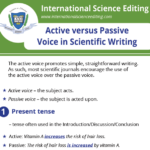In this e-learning module, Professor Emeritus Peter Jones discusses how to respond to a manuscript review. Professor Jones has over 40 years experience in plant science research, from molecular to crop community and has published >100 peer-reviewed papers, book chapters, and books. In addition, he was an associate editor for the European Journal of Plant […]
Would a lottery system improve #TrustInPeerReview?
An increasing number of agencies are using lottery systems to distribute research funding. Supporters of the approach have even suggested lotteries could be used by journals to select which papers to publish [1]. In this blog, we discuss how this would potentially work, and look at the pros and cons of such a system. How […]
Active versus passive voice in scientific writing (infographic)
In this infographic, we discuss the use of the active and passive voice in scientific writing. The infographic contains the following text: The active voice promotes simple, straightforward writing. As such, most scientific journals encourage the use of the active voice over the passive voice. Active voice – the subject acts. Passive voice – […]
How to write an introduction to a research report
In this blog, our guest blogger, Professor Emeritus Dolores Takemoto from Kansas State University discusses how to write an introduction. A thorough introduction is a necessary prerequisite for the most effective presentation of your research results. In addition, it optimizes your chances of getting your research report accepted for publication by a journal. Before you […]
“Many of our references are published in Chinese. Will this be a problem?”
This question was asked in the Q&A session of a recent talk on the topic of scientific publishing presented by International Science Editing in China. In this blog, we look more deeply at this question and discuss why there is no simple answer. Non-English sources may be a problem for reviewers Reviewers are generally instructed […]





